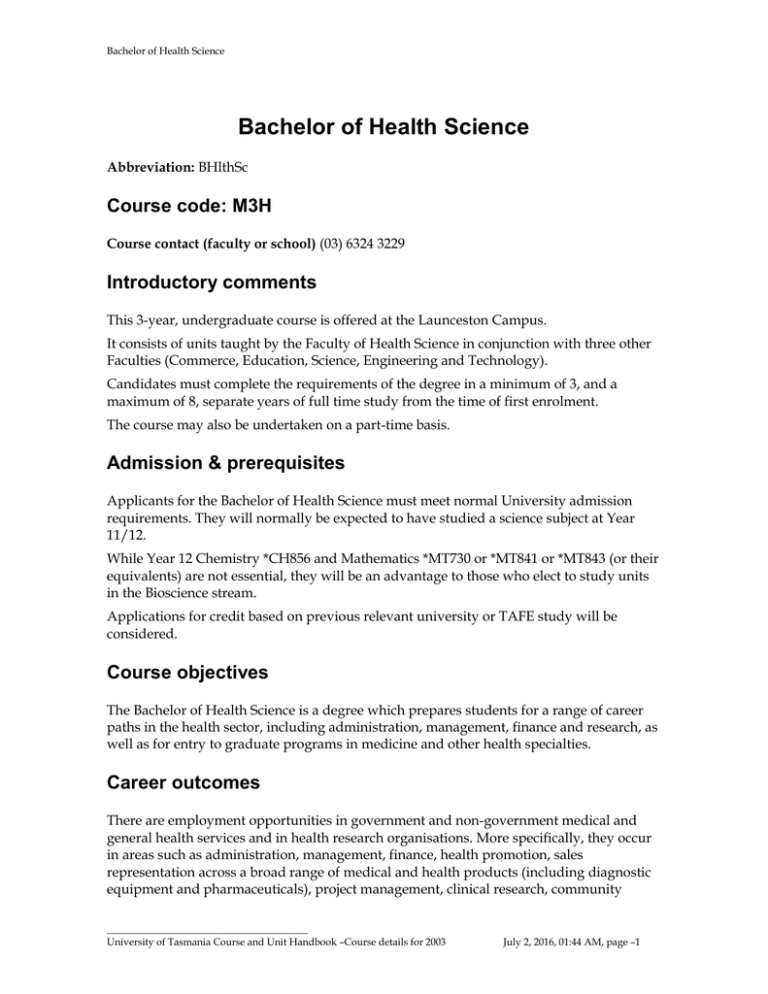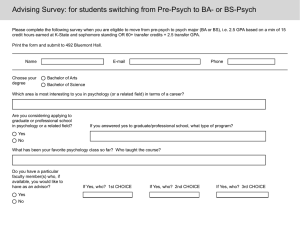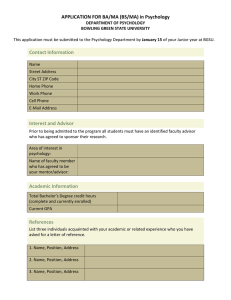BHlthSc
advertisement

Bachelor of Health Science Bachelor of Health Science Abbreviation: BHlthSc Course code: M3H Course contact (faculty or school) (03) 6324 3229 Introductory comments This 3-year, undergraduate course is offered at the Launceston Campus. It consists of units taught by the Faculty of Health Science in conjunction with three other Faculties (Commerce, Education, Science, Engineering and Technology). Candidates must complete the requirements of the degree in a minimum of 3, and a maximum of 8, separate years of full time study from the time of first enrolment. The course may also be undertaken on a part-time basis. Admission & prerequisites Applicants for the Bachelor of Health Science must meet normal University admission requirements. They will normally be expected to have studied a science subject at Year 11/12. While Year 12 Chemistry *CH856 and Mathematics *MT730 or *MT841 or *MT843 (or their equivalents) are not essential, they will be an advantage to those who elect to study units in the Bioscience stream. Applications for credit based on previous relevant university or TAFE study will be considered. Course objectives The Bachelor of Health Science is a degree which prepares students for a range of career paths in the health sector, including administration, management, finance and research, as well as for entry to graduate programs in medicine and other health specialties. Career outcomes There are employment opportunities in government and non-government medical and general health services and in health research organisations. More specifically, they occur in areas such as administration, management, finance, health promotion, sales representation across a broad range of medical and health products (including diagnostic equipment and pharmaceuticals), project management, clinical research, community ________________________________________ University of Tasmania Course and Unit Handbook –Course details for 2003 July 2, 2016, 01:44 AM, page –1 Bachelor of Health Science health groups, self-help groups, rehabilitation centres, welfare agencies, sports science and health and physical education. The course is also relevant to practising and potential health care professionals seeking a degree qualification. Professional recognition The Bachelor of Health Science is not limited to a single, professional discipline. It is a generic health science degree which qualifies its graduates to undertake further, more specialised, study in a number of disciplines and to pursue various career opportunities in the health sector. Course structure Year 1 units provide a foundation in the life sciences and an introduction to community health care and management. In Year 2 students undertake core units in conjunction with elective units from one or more of the specialist streams – Bioscience, Health and Lifestyle/Education or Business/Psychology. In Year 3 students undertake four core units in conjunction with further elective units from one or more of the streams. Overall students should take at least four units from one specific stream. The Bioscience stream provides an understanding of the structure and function of the human body, in both health and disease, and of the biochemical diagnosis of disease. The Health and Lifestyle/Education stream provides students with effective and interactive communication skills and an understanding of community education and development. It also allows study of the patterns of health and health services in Australia, and units in exercise and fitness. The Business/Psychology stream provides a background in fundamental business procedures and psychology of individuals, and in organisations and health care contexts. Articulation There is no articulation from other courses. However, some outstanding Year 1 Bachelor of Health Science students may be able to transfer into Year 2 of the Bachelor of Biomedical Science if places are available. These students must have completed Year 12 Chemistry *CH856 and Mathematics *MT730 or *MT841 or *MT843 and obtained results of a high standard in Year 1 of the Bachelor of Health Science. Schedule Please note that some combinations of units may not be available due to timetabling constraints. Students need to ensure that they have prerequisites for the elective streams. ________________________________________ University of Tasmania Course and Unit Handbook –Course details for 2003 July 2, 2016, 01:44 AM, page –2 Bachelor of Health Science Core Units campus offered weight unit code Cell Biology and Function L~1 12.5% CXA171 Either KJC103 or (KJC161 and CXA125) Chemistry 1[a] Chemistry for Life Sciences Introductory Biochemistry L~1&2 L~1 L~2 25% 12.5% 12.5% KJC103 KJC161 CXA125 H~1/2 L~1/2 B~1 [na] 12.5% 12.5% BMA101 KYA115 L~1 L~2 L~2 L~2 12.5% 12.5% 12.5% 12.5% CNA126 CXA102 CXA176 CXA172 Anatomy and Physiology 2 L~1 12.5% CXA273 Either ESV205 or CXA212 Communication Strategies Pathology of Common Disorders Exercise Physiology & Nutrition Perspectives on Ageing D~1 L~1 L~2 L~2w D~2 12.5% 12.5% 12.5% 12.5% ESV205 CXA212 CXA237 CNA246 12.5% 12.5% 12.5% 12.5% CXA386 CXA321 CXA309 CXA385 Unit title Year 1 Either BMA101 or KYA115 Introduction to Management Physics for Biomedical and Health Sciences[b][c] Health Care Where People Live and Work 1 Introduction to Health Sciences Microbiology and Health Anatomy and Physiology 1 Year 2 Plus 2 or 3 electives in semester 1 and 1 or 2 electives in semester 2 Year 3 Research and Topics in Health Sciences Immunology Health Services and Health Informatics Nutrition and Disease L~2 L~1 L~2 L~1 Plus 2 electives in semester 1 and 2 electives in semester 2 [a] Students must have completed Year 12 Chemistry. Students with Year 12 Chemistry may do CXA101 plus CXA125 instead. [b] Unit content is still being developed and subject to approval. Students are advised to check the web for further details. [c] Students must have studied a science subject including physics in Years 11 and/or 12 and some Mathematics. Elective Streams Note: At least 4 (and preferably more) units must be taken from one of the following three streams: Bioscience, Business/Psychology or Health and Lifestyle/Education, with at least two of these units being at 200 level. Other elective units may come from the same or ________________________________________ University of Tasmania Course and Unit Handbook –Course details for 2003 July 2, 2016, 01:44 AM, page –3 Bachelor of Health Science another stream, subject to prerequisites and timetable constraints. Subject also to prerequisites, the units can be taken in a different order as inevitable timetabling constraints may preclude some combinations. Not all units are offered every year. Bioscience Unit title campus offered weight unit code L~1 L~1 L~2 L~2 12.5% 12.5% 12.5% 12.5% CXA261 CXA101 CXA262 CXA251 w L~1 12.5% 12.5% 12.5% 12.5% CXA300 CXA352 CXA353 CXA241 Year 2 Metabolic Biochemistry Medical Laboratory Practice 1 Cell and Molecular Biochemistry Clinical Chemistry 1 Year 3 Human Molecular Biology Clinical Chemistry 2 Clinical Chemistry 3 (Endocrinology) General and Medical Microbiology L~1 L~2 L~2 Health and Lifestyle/Education Unit title campus offered weight L~1 D~1 L~1 L~2 L~2 D~2 12.5% 12.5% 12.5% 12.5% 12.5% 12.5% ESP230 ESV205 CNA245 HAB213/313 CXA132 ESV203 L~1 D~1 w L~1 H~1 B~1 L~2 D~2 [na] 12.5% 12.5% 12.5% 12.5% 12.5% 12.5% CXA337 ESV307 CNA308 CXA308 ESV308 CXA437 unit code Year 2 Health Fitness & Physical Activity Communication Strategies[a] Child and Adolescent Health Indigenous Health[b] Kinesiology Foundations of Adult Learning[a] Year 3 Exercise Physiology Community and Public Education 1 Legal and Ethical Issues in Health Care[c] Exercise Assessment and Prescription Community and Public Education 2 Advanced Physiology and Nutrition[d] [a] If not taken as a core unit. [b] Use level 200 enrolment code HAB213 [c] Corequisites not required for students enrolled in M3H [d] Will be offered in alternate years. ________________________________________ University of Tasmania Course and Unit Handbook –Course details for 2003 July 2, 2016, 01:44 AM, page –4 Bachelor of Health Science Business/Psychology campus offered weight unit code H~3/1 L~1 H~3/1 L~1 B~1v D~1w H~3/2 L~2 H~2 L~2 B~2v D~2w 12.5% 12.5% BMA201 KHA101 12.5% 12.5% BMA121/221 KHA102 Workplace Relations Research Methods in Psychology H~1 L~1 H~1L~1 12.5% 12.5% BMA241 KHA201 Either KHA254/354 or KHA207/307 Clinical & Health Psychology[a][b] Social Psychology[a][b] Developmental Psychology L~2 [na] H~2L~2 12.5% 12.5% 12.5% KHA254/354 KHA207/307 KHA202 Either KHA256/356 or KHA215/315 Applied Topics in Psychology[b] Organisational Psychology[b] Principles of Marketing[c] Financial Management[c] L~1/2 L~1 H~3/2 L~2 O~tba H~3/2 L~2 O~tba 12.5% 12.5% 12.5% 12.5% KHA256/356 KHA215/315 BMA151/251 BFA181/281 Unit title Year 2 Organisational Behaviour Psychology 1A Management of Human Resources Psychology 1B Year 3 [a] use year-3 enrolment code (eg KHA354, not 254) [b] psychology units are offered in alternate years [c] use level 200 enrolment code BMA215 Note: 1. The Business options are from the Business Management major. 2. The above allows a selection of at least four units in Psychology/Behavioural Science or four in Business or a combination of the two, with students able to take a greater number to provide a comprehensive stream. Note: The following information is NOT included in the printed edition of the Course and Unit Handbook Additional Information The following information answers some frequently asked questions. Note, however, details should be confirmed with the appropriate authority Responsible faculty or school | Faculty of Health Science Campus(es) offered | Launceston Mode of delivery| Full time | Part time Course duration | 3 years minimum (6 semesters) | 8 years maximum (16 semesters) ________________________________________ University of Tasmania Course and Unit Handbook –Course details for 2003 July 2, 2016, 01:44 AM, page –5


